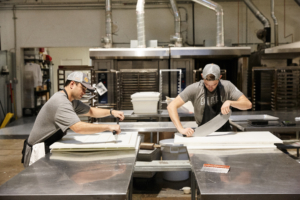Upcycling food waste is potentially big business
Food Engineering and Ingredients speaks to Dan Kurzrock, the co-founder and CEO of the novel food waste upcycling company ReGrained, about upcycling, the products they develop and the economics of it all.
Food Engineering and Ingredients: What is ReGrained? Dan Kurzrock:
ReGrained is the leading company driving upcycled food innovation. As a food technology and ingredient platform, we are focused on collaborating with food makers of all sizes to co-develop upcycled food products. We also create limitedrun, ReGrained-branded products to experiment and explore all the possibilities using our upcycled ingredients.
FEI: Where is it based and when do you launch it? DK:
Berkeley, California. We launched in 2012.
FEI: Why did you launch it? DK:
When I began to brew beer at the University of California Los Angeles, over a decade ago, my eyes were opened to how much food I was leaving behind with each batch. It takes about 1-pound of grain to make a 6-pack of beer! The amount of waste bothered me and felt like a latent opportunity. After discovering that the post-brewed grains were both tasty and nutritious, I began to incorporate them into loaves of bread, and then sell them in order to cover my homebrewing expenses. As a sustainability nerd, I had heard the term “upcycling” used to describe projects that used the waste materials from one industry to create a new use for another industry.
That’s when I saw the potential for “upcycled food” and my own brewer’s spent grain (BSG) was where it started – ReGrained was born!
FEI: What were some of the challenges you faced in establishing the business? DK:
We knew we were starting with a great idea, but that building it into a great business would be a process. While we identified that the largest opportunity for impact would be to create an ingredient business that would connect the dots between the brewers’ grain supply chain and food manufacturers, we initially had no idea how we would process it safely and efficiently at scale. This supply-side challenge is what led to our research partnership with the United States Department of Agriculture and ultimately our patented technology.
On the demand-side of the model, we also had the unique opportunity to pioneer the various applications for how our proprietary ingredients could be used. Fortunately, we continue to be blown away by the versatility, but we had a lot to learn. For example, although the ingredient is derived from barley and thus naturally contains gluten, the gluten’s functionality is extracted during the brewing process. So, for bakery applications as an example, it was important to not only optimize for the right inclusion ratio to deliver the great nutrient density and flavour we bring to the table, but also to blend with the optimal other ingredients to deliver on texture.
FEI: From where do you source your waste products for upcycling? DK:
ReGrained SuperGrain+® is the flagship certified upcycled value-added ingredient made from brewer’s spent grain (BSG).
We primarily source our BSG from California craft beer brands near our facility such as Fort Point and East Brother. However, we estimate that the United States at large generates over 20 billion pounds of BSG each year. As we continue to scale, we will source grain from all over the world, such as from our strategic investors MolsonCoors and others.
FEI: What food waste can be potentially upcycled with your technology? DK:
The patented technology we co-developed with the United States Department of Agriculture is the ‘gold standard’ in upcycling saturated solids like brewer’s grain and other analogous food industry inputs. For example, it can be used with other food processing by-products from the beverage industry such as pulps from juice and residues from plant-based milks like oat.
FEI: As I understand it, you supply ReGrained products to the Food Tech industry for the production of consumer foods. Is this correct? Can you tell us a bit more about this? DK:
Correct, ReGrained is a food tech and ingredient platform to drive upcycled product innovation. We have a research and development consultancy that collaborates with food makers to develop and launch scalable and highly-marketable upcycled food products and menu items. It includes the Upcycled Food Lab, Commercial Ingredient Portfolio and forthcoming Upcycled Food Marketplace.
ReGrained has developed award-winning CPG [consumer packaged goods] snack products to experiment, innovate and demonstrate the viability of upcycled products to catalyse commercial categories. We then apply these learnings to our partner collaborations. The products are available for purchase through our website for a limited time.
FEI: Can you give some examples of companies that use your ingredients and what do they produce with them? DK:
Our Upcycled Food Lab currently has over 60 projects in development with brands across a wide range of categories that cover nearly every aisle of the grocery store. We also work with food service operators on fresh concepts for menu items, such as pizza. From emerging to global companies, our product development projects run the gamut from reformulating familiar favourites to inventing new items all together. Due to the strict nature of confidentiality agreements for projects still in progress, we are limited as to what we can specifically disclose. Here are a few examples that we co-developed with food maker partners that launched in the last year.
Doughp is a great example of a collaboration with a fast-growing CPG brand, a customer base thanks to our expansion we now have the capacity to support. Doughp is an edible and bakeable cookie dough eCommerce brand who joined forces with ReGrained’s Upcycled Food Lab to develop their “Beast Mode Brownie” flavour. This limited release item incorporates SuperGrain+ into a sweet indulgence with 2x the protein and 6x the fibre than conventional flavours. This flavour launched in April 2021 and to date remains one of their best-sellers.
Bi-Rite, a San Francisco Bay Area ice cream institution, is on their second flavour using ReGrained. This one is a vegan ice-cream that they made by steeping SuperGrain+ in coconut milk before combining with roasted bananas (upcycled from unsellable, overripe bananas sourced from their parent company’s grocery store) and toasted pecans. The result is delicious, plant-based and upcycled!
We also have loads going on in commercial bakery. One example I can discuss, Panorama Bakery, a Northern California institution has an incredible brioche, with ReGrained featured prominently in the dough. A few are offering Bavarian style pretzels. We have many other types of breads, cookies and baked goods in the works.
Last but certainly not least, ReGrained co-developed an upcycled pasta with Semolina Artisanal Pasta, based in Pasadena, California. The new upcycled pasta, Strozzapreti, is a contemporary twist on a unique pastamaking tradition by blending the company’s signature durum semolina pasta with ReGrained SuperGrain+. The upcycled Strozzapreti boasts Semolina Artisanal Pasta’s beloved toothy texture and a wonderful malty flavour from SuperGrain+ while offering 3-times the fibre of traditional whole grain flours.
FEI: Can you explain briefly the process/ technology you use to upcycle discarded food? DK:
We make the ‘magic’ happen using a patented thermo-mechanical process that we developed in partnership with the United States Department of Agriculture. Our unique technology leverages a novel application of infrared to unlock what is otherwise a challenging supply chain in a scalable, energy-efficient way.
FEI: Can you give some indicators of the economics behind the process – what sort of savings can be achieved by using upcycled products; How does the cost of your products compare to similar original source products? DK:
The upcycled food industry is in its infancy in many respects. For instance, the Upcycled Food Association (UFA), of which ReGrained is a co-founder, only formed two years ago. And three months ago, the UFA announced the first cohort of companies to receive the upcycled certification standard. (ReGrained SuperGrain+ received the certification.)
The cost of upcycled ingredients varies greatly depending on the specific supply chain, scale of the producer, and ultimate application. ReGrained SuperGrain+ is on parity with nutritionally similar ingredients like nuts and seeds. On a cost-per-gram of protein and fibre basis, the cost is very competitive. The inclusion ratio also matters. For example, in bakery SuperGrain+ is used on average at 15%, so the impact on the input cost is easily balanced by the communicable premium of the output.
In addition to compelling value for nutrient density, we also have a compelling sustainability story that increasingly resonates with consumers. According to the International Food Information Council’s 2021 Food & Health Survey, 67% of consumers who believe their choices impact the environment said ‘environmental sustainability’ is a key purchase driver.
FEI: How much food waste could be potentially prevented through upcycling? DK:
As I mentioned earlier, the United States generates over 20 billion pounds of BSG each year that typically reaches food waste. In 2020 alone, ReGrained upcycled approximately 500,000 pounds of BSG, so there is a tremendous opportunity to have a significant impact as we scale our work with food makers. We estimate value-added ingredients and products from BSG alone to be a multi-billion-dollar opportunity.
More broadly speaking, it’s challenging to pinpoint an exact number because upcycling is such a new technology in the food industry. ReFED’s industry leading insights engine, launched in February of 2021, has valued upcycling as a US$2.69 billion market. The company cites upcycling as the top solution for manufacturers in terms of both economic and environmental impact. [1] Future Market Insights estimates the market is US$46.7 billion with an expected CAGR of 5%.[2]
Qualitatively, upcycling has a direct impact on the financial bottom line. Wasted food equals wasted money. So, unlike other equally pressing solutions to climate change, the incentives are in the right places across the board for a more circular economy for upcycled food to take off in a major way.
FEI: How fast is your business growing? DK: While I respect the question, for us, speed is not the goal. Sustainable growth and lasting impact are. Our enterprise-scale projects can take several years to come to fruition, but when they do, growth is a step-function not a linear curve. Consider a national launch, and the way it goes from zero distribution to thousands.
We have dozens of such projects in the pipeline, as well as collaborations with emerging brands that move faster. In September alone, we had two launches: one with Semolina Artisanal Pasta, a taste-making brand of high-end pasta, and an ice cream with a coveted regional creamery. In the fall we have the retail expansion of Doughp’s edible cookie dough item, and a few others in the works that we will be able to share soon.
FEI: Is there anything you’d like to add? DK:
As a global economy, we must learn to do more with less. Resources are limited, dwindling, and subject to human whims. Industry titans and start-ups have both the responsibility and opportunity to play a key role in shaping a more sustainable future…a more resilient food system for generations to come – one where to paraphrase the late-great Buckminster Fuller, there is enough, for all, forever. Upcycled food innovation can help us get there. We’re here as a catalysing agent of this change.
References
1. ReFED Insights Engine: “Manufacturing Byproduct Utilization (Upcycling” https://insights-engine.refed.com/solution-database/ manufacturing-byproduct-utilization-upcycling
2. Future Market Insights: “Products from Food Waste Market – Key Research Findings” https://www.futuremarketinsights.com/reports/products-from-food-waste-market
Learn more
• To find out more about ReGrained and their upcycled products, visit: https://www.regrained.com/
• To learn more about upcycled food, visit: https://www.upcycledfood.org/




